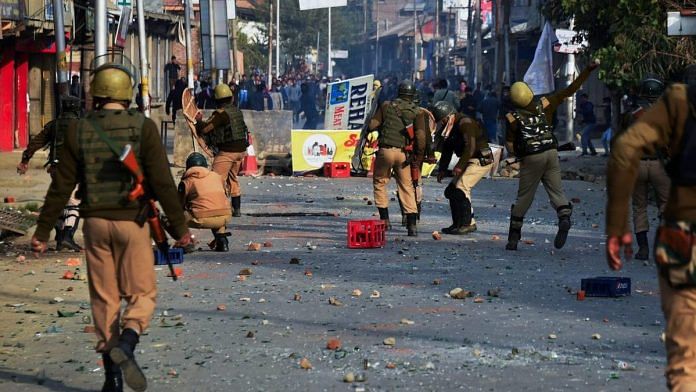Srinagar: The Jammu and Kashmir administration has introduced a new strategy of peer group guarantees for angry youth in a bid to counter stone pelting in the Valley.
Called the ‘informal community bond’, it involves forming peer group circles, around youths detained for stone pelting, whose members then sign an undertaking providing assurance about the youth’s behaviour.
The ‘informal community bond’ is an undertaking signed by a minimum of 30 people who will include family, friends, teachers, religious leaders and other important community members of the youth, detained for stone-pelting before being released.
The move has been introduced by senior IPS officer K. Vijay Kumar, the security advisor to J&K Governor Satypal Malik, said a source in the government. The government is claiming that in the instances of the bonds having been signed, the youth have not returned to unlawful activities.
A moral arrangement: Kumar
Kumar calls the informal bond “more like a moral arrangement”.
“The local community in Kashmir has always stood for peace and tranquillity in the state,” Kumar said. “We have put our faith in them once again and we have been proven right. Even though the state police is involved in counselling the Valley’s youth, a word from their community members or elders can usher positive change.”
A senior police officer posted in south Kashmir said that in one particular district, 378 youths had been detained in the last year of whom 320 were released under the community bond mechanism.
“The maximum number of people who signed the community bond is 110. They had given assurance on behalf of three youth,” the officer said. “The minimum has been 30 in each case.”
The officer added that the effect of the bonds was seen in the 2019 Lok Sabha elections. “There weren’t as many stone pelting incidents during the election period and this is a direct result of the involvement of the community,” the officer said.
Also read: Terror recruitment & stone pelting in Kashmir has dropped this year, says govt
Mixed reaction on the ground
The move by the state administration has garnered mixed reaction on the ground with those involved in the process supporting it while others not so much.
Bashir Malik, a former sarpanch in Pulwama, said the impact of what he terms as a “social bond” has been “50-50”. “See, it does have an impact but it is also true that people who want to protest do it in any case. Among the people, the move has certainly been taken positively,” Malik said.
Speaking to ThePrint, an advocate from South Kashmir, said the move resembles the good behaviour bond obtained under section 107/151 of CRPC.
“This is permitted under law but it can open up the concerned or detained youth for a lifetime of surveillance,” the advocate said, on the condition of anonymity. “It could also mean that the youth could be at times be unfairly pressurised or accused by his community for actions of others.”
Also read: ‘Hartal’ to neta — how a notorious Srinagar stone-thrower found his calling in politics



